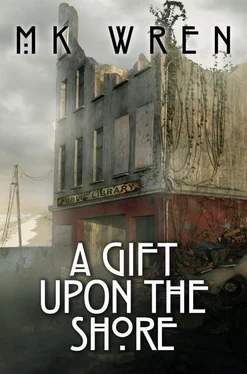Rachel’s domain was fenced with barbless wire. When she reached the gate in the southeast corner, she had to stop and get out to unlock and open the gate, drive through, and get out again to close it. Then she drove along a gravel road that curved to the south. At one point she gestured toward the side of the road. “That’s where I found you.”
Mary didn’t remember the place, only what brought her to it, and she shivered. “You’re a true good Samaritan, Rachel.”
Rachel laughed. “I doubt that.”
“I mean it. I’d have died if you hadn’t found me.”
Rachel glanced at her, but made no comment, concentrating on shifting gears where the gravel road met a paved loop. Mary leaned forward, hands braced on the dashboard, her pulse quickening. She remembered now. This loop marked the end of North Front Road, which ran parallel to the beach for a mile before angling inland to make a Y with Highway 101. Aunt Jan’s house was at the south end of town, but in that childhood summer she and her parents had explored all of Shiloh by bicycle or on foot. Rachel pointed out the Acres house northwest of the loop, but Mary was too distracted by memories and anticipation to garner more than an impression of ochre-stained wood and great spans of glass. Nor was she interested in the other houses as they drove along North Front Road. Maybe there were a lot of FOR SALE signs, but she ignored them.
The shopping mall at the junction of North Front and the highway surprised her. It had been built since she was last in Shiloh. Rachel said, “This is really Shiloh’s downtown these days.” Yet half the mall’s shops were vacant. Mary ignored that, too.
And on the highway, which served as Shiloh’s main street, she ignored the empty buildings and boarded-up windows. There were still shops open for business here. The bakery—yes, she remembered that and its rich crumpet bread—a barber shop, a laundromat.
After three blocks, Rachel turned left into a parking lot. On the south was an aged building with scarred, brick walls. That, Rachel informed her, was Connie Acres’s clinic. Mary only glanced at it. North of the parking lot stood a new building, flat-roofed, olive drab cement block, metal letters above the entry: U.S. AUXILIARY POLICE STATION, CENTRAL OREGON COAST DIVISION. A communication tower loomed over the building, its dish antennas bizarre blossoms on the latticed steel stem. Six black Apie patrol cars were lined up in front of the station.
Mary still didn’t understand why Jim Acres insisted on going with them to her aunt’s house, why he further insisted that they meet him here. And when he came out of the station, it was in the company of an Apie captain who looked like a model for a recruiting poster.
When Rachel and Mary got out of the van, Jim made the introductions. Captain Harry Berden, tall and hard and handsome. He spoke with a Western drawl and hailed from Boise, Idaho. Mary found herself pleased with his assessing gaze as he courteously expressed regret that she’d been caught in the Rover ambush.
But she was less than pleased when Jim put in casually, “Harry’s going to drive us down to your aunt’s house in his patrol.”
Mary looked at Jim sharply, but he seemed incapable of meeting her eye. She smiled at Harry Berden and said, “Well, we’d enjoy your company, Captain, but I don’t really think we need a police escort.”
“You do, ma’am,” he answered soberly. “Take my word for it.”
Then he explained in his easy drawl that after the oil crunch hit Shiloh so hard, the few people who stayed—no more than five hundred, he estimated—had moved into the north end of town. There was safety in banding together. The south end, well, it had been left to the squatters. And he explained that 101 was a hobo’s highway, a migration route for the homeless and hopeless. And he explained that the Apie garrison here was understaffed, under-equipped, and they had more pressing problems than what he called the wild geese. The highway was turf to road gangs; the Rovers that attacked her bus were still holed up somewhere around Shiloh. And he explained that he knew from the address that her aunt’s house was within the area occupied by the nomads. Forfeited to them.
Squatters’ land, he called it.
Mary listened, feeling unexpectedly dizzy, and she wanted to deny it all with a laugh, but she read something in Captain Berden’s eyes that made any denial a delusion. Those young eyes—he was no more than thirty—were suddenly old. There was no despair in them; only a bleak acceptance that was as much a witness to old wounds as a scar.
Yet she couldn’t surrender her dream. She had nothing else to hold on to. She had to see the house for herself.
And she did.
Squatters’ land. It had been a pleasant neighborhood, most of the houses weekenders, but well kept. Now it was as desolate as a war zone, half the dwellings burned ruins engulfed in blackberry vines. Mary sat in the backseat of the black car and stared out through bullet-proof glass, her mind denying the reality her eyes presented her. She caught glimpses of the squatters, ragged wraiths peering through broken windows, running across yards inundated by brittle, gray weeds. One of them—an old man with a prophet’s beard—paused to give the police car a defiant finger before he disappeared behind a burned cottage.
She wondered numbly why the captain finally stopped the car. She didn’t recognize the house. This was only a shack giving way to weather and weeds, shingles blown off the roof, a climbing rose gone wild festooning the porch, growing through the broken windows.
It was Aunt Jan’s prized climbing Peace rose. This was Aunt Jan’s house. Mary felt that realization reverberating within her at the same moment she saw three shadowy figures burst out of the front door and vanish within seconds.
She knew she should surrender then. But she couldn’t. Not yet.
At the captain’s suggestion, Jim stayed in the car. He knew how to use the radio. Berden and Rachel went into the house with Mary.
The musty emptiness, the sour smell of filth and mildew, made her skin crawl. All the furniture was gone—except for the charred fragments of carved table legs and chair backs in the fireplace. The sound of the surf echoed hollowly against the smoke-grimed walls; the west windows were empty rectangles. She made her way to the kitchen in the northeast corner. No stove or refrigerator, no cabinets, not even a sink. Pipes thrust out of scarred walls, and in one corner three rats foraged on a mound of garbage. Mary stumbled back, caught her foot on a loose floorboard, and gasped with a spasm of pain.
The bathroom door was missing and so were the fixtures, except for the toilet that overflowed with foul, brown liquid. She went to the bedroom door. Where the door had been. A mattress, strewn with tangles of dirty blankets, lay on the floor. Tom organdy curtains writhed in the wind that blew cold through the empty window frames.
A shadow of movement drew her to the north window. Behind the house next door, three people were standing, waiting. Two bearded men. A woman. No, a girl. Maybe seventeen. She stared at Mary with dark, unblinking eyes, and Mary read there fear, anger, resentment, and a hunger that transcended the simple need for food, a hunger Mary knew to be beyond appeasement, and perhaps the girl knew it, too.
They stared at each other through the empty window, each looking into another plane of existence, and all that stood between Mary and that hungry-eyed, feral creature was a distance of a few yards.
Then abruptly the squatters turned, ragged clothes flapping, and they disappeared.
And at that moment the dream died beyond hope of resurrection.
The wreck of the house might be repaired—if she had the tens of thousands of dollars to spend on it—but the squatters, the wild geese, would still be here, waiting. The deed that had been the lucent focus of all her hope was only a scrap of paper. This house was theirs now.
Читать дальше












